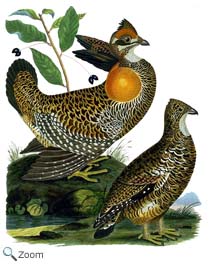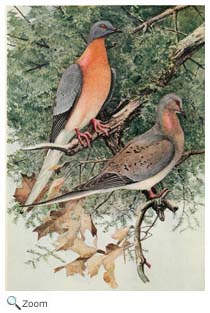Birds
Carolina parakeet
Conuropsis carolinensis carolinensis
 The Carolina parakeet was once common in the The Carolina parakeet was once common in the
southeastern United States. The Carolina parakeet was a seed eater and often ate the seeds of fruit and grain crops. Farmers considered the parakeet a pest and killed them in large numbers. They were also often captured and kept as caged pets. They became extinct around 1920.
Heath Hen
Tympanuchus cupido cupido
 The heath hen, a subspecies of the prairie chicken, was once found in the eastern United States. Before the American Revolution, it was common from Maine to Virginia. As the human population increased, the heath hen population decreased, largely due to hunting. By 1907, there were fewer than 100 heath hens left in the United States. The heath hen, a subspecies of the prairie chicken, was once found in the eastern United States. Before the American Revolution, it was common from Maine to Virginia. As the human population increased, the heath hen population decreased, largely due to hunting. By 1907, there were fewer than 100 heath hens left in the United States.
Efforts were made to save the remaining heath hens and a sanctuary was created for them on Martha's Vineyard, a small island off the coast of Massachusetts. By 1916, the population slowly increased to over 800 birds, but a large part of their breeding ground was destroyed by fire that year. This, along with an unusually harsh winter the following year and an increase in the goshawk population, reduced the heath hen population to 100 birds. By 1920 their numbers had doubled to 200 birds.
In 1921 a disease carried by domestic chickens spread to the heath hen population and their number dropped to 100 birds. By 1927 there were only 13 heath hens left. The last heath hen died in 1932.
Passenger Pigeon
Ectopistes migratorius
 The passenger pigeon was a common bird in central and eastern North America. Scientists estimate that the population at one time may have numbered between three and five million birds. It lived in large colonies. It probably became extinct from a combination of natural and man-made causes. Hunting, along with a low reproduction rate, led to the bird's extinction. The last known passenger pigeon died at the Cincinnati Zoo in 1914. The passenger pigeon was a common bird in central and eastern North America. Scientists estimate that the population at one time may have numbered between three and five million birds. It lived in large colonies. It probably became extinct from a combination of natural and man-made causes. Hunting, along with a low reproduction rate, led to the bird's extinction. The last known passenger pigeon died at the Cincinnati Zoo in 1914.
|
| | |
Fish
Blackfin cisco
Coregonus nigripinnis
The blackfin cisco, also known as the jumbo herring, was once found in lakes Huron, Michigan, Ontario, and Superior. It was a silver fish with black fins and a black stripe on its spine. By the 1940s its numbers were greatly reduced due to over fishing. Predation from an introduced species, the sea lamprey, further reduced their number and they were extinct by 1960.
Blue Pike
Stizostedion vitreum glaucum
The blue pike was once found in the Great Lakes region of the United States and Canada. Over fishing, pollution, and the introduction on non-native species lead to its extinction in 1970.
Mammals
Eastern Elk
Cervus canadensis canadensis
The eastern elk was once found in the United States east of the Great Plains. It became extinct in 1880.
Sea Mink
Mustela macrodon
The sea mink is believed to have lived on the rocky coasts off the waters of New England and eastern Canada. It was twice the size of the American mink. It was hunted for its pelt. It became extinct by the 1890s. |